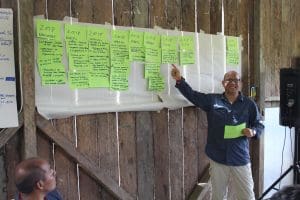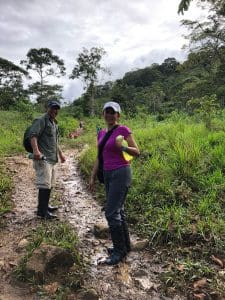Meeting at the Table: Peaceful Outcomes and Satisfied Parties. Member Spotlight: Luis Ore
“Conflicts are usually resolved in one of three ways: through power and strong-arming, through legality, or through approached that are interest-based. The last is my focus because that is where deep conversations occur and everyone can leave satisfied.”
This contention is one of Luis Ore’s who is a negotiation and consensus-building practitioner and mediator based in Lima, Peru. He holds a Juris Doctorate and two masters degrees in organizational communications and conflict management. As director of ORASI Consulting Group, Luis specializes in facilitating cross-cultural understanding, collaboration, conflict prevention, and dispute resolution between stakeholders in the United States and throughout Latin-America.
Early Inspirations and Impactful Training

Luis discovered his interest in this field when he was in his final year of high school. He remembers, “My father always read a lot and, one day, I came across a book of his entitled, ‘Getting to Yes’ and it changed my life.” Authored by American negotiation experts, William Ury and Roger Fisher, “Getting to Yes” discusses the psychology of negotiation and the processes by which a consensus can be forged among diverse people and organizations. “That book was the foundation for the Harvard Negotiation Project, which inspired me to pursue this line of work,” Luis said.
In subsequent years, Luis studied law at the Universidad de Lima where he gravitated to the courses that dealt with alternative dispute resolution. After graduation and serving a brief stint as a lawyer within the Peruvian government, he took an advanced training course on the Harvard negotiation model. Luis recalled, “I fell in love with the model and knew I wanted to tailor my work to helping people negotiate.” Luis soon moved to United States to further his education at Western Kentucky University and then Lipscomb University. He reveled in the opportunity to study conflict management in depth while also becoming fluent in English. Luis felt that the experiences and connections he gained during that time have defined his career. “I think I considered myself an ‘attorney in recovery’ since law school had taught me to fight and, now, I was learning to help people talk,” he said.
In addition to his core studies, Luis learned from working with refugee communities and large U.S. companies, serving as a volunteer with the Association for Conflict Resolution, and completing a negotiation program at the place that inspired it all; Harvard University. “I met all my role models there,” he noted.
The Work: Challenges and Rewards
 Luis spoke about his field experiences over the years with tremendous fervency. He has engaged with diverse parties, including indigenous communities in the Peruvian jungle, leaders of international corporations, and top government representatives. The process of identifying sustainable solutions to the issues at hand has always been a unique challenge, but the use of mediation in these contexts has been crucial. Luis stated, “Everyone wants access to resources which are limited, and we all have more needs and more interests at the table which cannot be satisfied with law or power exclusively.” Further, Luis noted, “It is when we stop talking that the problems really start.” Mediation is an effective remedy because “It allows the fight to continue but at the table.”
Luis spoke about his field experiences over the years with tremendous fervency. He has engaged with diverse parties, including indigenous communities in the Peruvian jungle, leaders of international corporations, and top government representatives. The process of identifying sustainable solutions to the issues at hand has always been a unique challenge, but the use of mediation in these contexts has been crucial. Luis stated, “Everyone wants access to resources which are limited, and we all have more needs and more interests at the table which cannot be satisfied with law or power exclusively.” Further, Luis noted, “It is when we stop talking that the problems really start.” Mediation is an effective remedy because “It allows the fight to continue but at the table.”
For Luis, the act of presenting tools that bring about peaceful outcomes and satisfied parties has been the most rewarding aspect of his career. He specifically referenced that the “aha moment” is his favorite. “It is the moment when a group of people recognizes that a joint dialogue is actually leading to their interests being fulfilled.”
MBBI and the Future
“MBBI is a support and resource to anyone in this field,” Luis said. He hopes to become more involved in the months and years to come by creating a Lima-based working group and collaborating on new initiatives. He sees an opportunity for MBBI to demonstrate how mediation may be implemented more readily during the designing stage of company projects in order to increase the likelihood of successful implementation and sustainability. “I would love to see this happen on a wider scale.”
In closing, he remarked, “MBBI is a community for listening to and sharing experiences and challenges, which builds a paradigm of mutual gain.”
Article by Juliana Heffern, MBBI Writer
